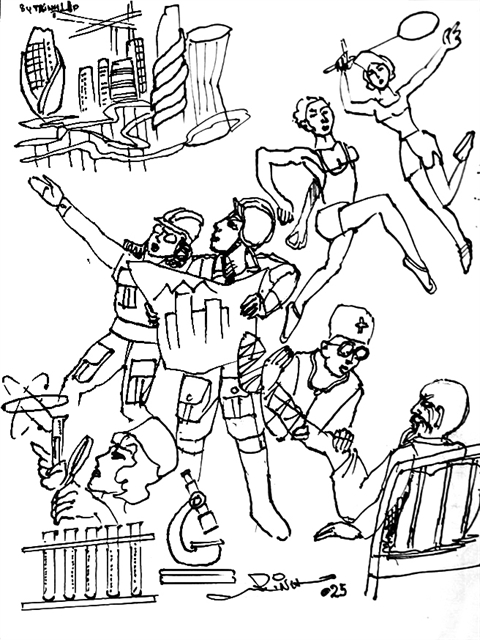 Talk Around Town
Talk Around Town

 |
| Illustration by Trịnh Lập |
By Nguyễn Mỹ Hà
A disturbing incident recently went viral online, showing the driver of a Lexus harassing, assaulting and injuring a motorbike delivery man. The video clip captured the moment when the heavily loaded shipper emerged from a narrow lane and encountered the car. After a brief verbal exchange, someone inside the Lexus said something that appeared to trigger the driver. He got out of his vehicle and began physically attacking the shipper—punching, kicking, and even using the shipper’s helmet to strike him until it broke.
The victim, a man from Thanh Hóa, had moved to Hà Nội with his wife over a year ago. Despite having lost one of his hands in a previous accident, he continues to work tirelessly to provide for his family, including two school-aged children.
This incident is a stark illustration of the divide between those who have—represented by the Lexus driver—and those who struggle to make ends meet, like the shipper.
"I think this case should serve as an example for those who believe that having more wealth gives them the right to abuse others," wrote many shocked online readers after watching the video. The shipper, notably, did not attempt to fight back. His priority was to protect his delivery box—ensuring that the cakes inside did not fall or get damaged.
Given that the victim has a disability, it is important to hear from representatives of the Hà Nội Association for Disabled People, who should strongly condemn such brutality.
This attack is just one in a series of recent assaults on motorbike delivery workers, raising public concern over the behaviour of some wealthy individuals. Many have asked, "How can people with such privilege be so ruthless?"
The incident also calls into question the deeper meaning behind a national slogan Việt Nam has long pursued: "A wealthy people, a strong nation." Wealth should not be measured solely in material terms but also in generosity, kindness, and social responsibility.
Over the years, Việt Nam has demonstrated resilience and solidarity, particularly during natural disasters such as tropical storms, landslides, and floods. But in everyday life, when incidents like this occur, one must wonder—what is the ultimate goal of accumulating wealth and power?
During a recent National Assembly debate, President Lương Cường emphasised the need to focus not just on economic growth but also on improving people's quality of life. "We need to ensure that people live well and not just have financial stability. In the past, we aimed for enough food and warm clothing. Now, we must ensure that people eat well and dress well," he said.
His vision for a prosperous nation is commendable, but alongside economic progress, society must also cultivate values such as empathy and respect. True development means not only having a healthy population in the physical sense but also ensuring mental wellbeing—where individuals are not so easily provoked by a few words.
One must also ask: "What role does education and family upbringing play in shaping such aggressive behaviour? Are social influences also contributing?"
A recent film critic sparked debate when he questioned the rise of blockbuster films that, while visually stunning, lack depth and meaningful storytelling. These films, filled with images of wealth, luxury cars, and extravagant fashion, dominate the box office, bringing huge profits to producers. But what impact do they leave on young audiences?
As the legal process unfolds, the public eagerly awaits a fair trial. Many believe the Lexus driver deserves severe punishment as a way to compensate for the harm inflicted on the injured shipper. However, justice should also offer an opportunity for redemption—allowing the perpetrator to take responsibility and repair the damage he has caused.
Ultimately, the court will rule according to the law, regardless of public sentiment.
Incidents like this highlight the contrast between different approaches to conflict. Those who have travelled or worked in Laos often speak of the remarkable patience and composure of Laotian people. Stories circulate about minor traffic accidents where, instead of heated arguments, Laotians calmly discuss their perspectives for so long that they eventually move to a roadside café to continue their conversation over drinks.
Perhaps one of this year’s resolutions should be to visit Laos and witness firsthand the culture of patience and mutual respect. VNS




